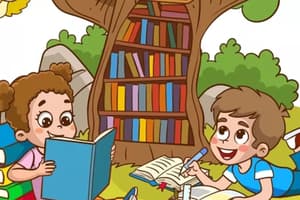Podcast
Questions and Answers
What is the main focus of studying English as a subject?
What is the main focus of studying English as a subject?
- Mathematics and calculations
- Language, literature, and composition (correct)
- Physical education
- Scientific experiments
Which skill is NOT typically developed through the study of English?
Which skill is NOT typically developed through the study of English?
- Literary analysis
- Writing skills
- Reading comprehension
- Advanced calculus (correct)
What is the ultimate goal of studying English?
What is the ultimate goal of studying English?
- To learn about foreign cultures only
- To memorize vocabulary
- To ignore historical context
- To develop effective communication skills (correct)
Which period is part of the historical development of the English language?
Which period is part of the historical development of the English language?
What does literacy primarily include?
What does literacy primarily include?
Which of these is a key element in early literacy development?
Which of these is a key element in early literacy development?
What involves connecting sounds with letters or groups of letters?
What involves connecting sounds with letters or groups of letters?
Which of the following is a reading comprehension strategy?
Which of the following is a reading comprehension strategy?
What does literature mainly include?
What does literature mainly include?
Studying literature helps students develop what skills?
Studying literature helps students develop what skills?
Which of these is an example of a literary device?
Which of these is an example of a literary device?
What does composition primarily involve?
What does composition primarily involve?
What is rhetoric the art of?
What is rhetoric the art of?
Which of the following is a stage in the writing process?
Which of the following is a stage in the writing process?
What does communication involve?
What does communication involve?
What does verbal communication include?
What does verbal communication include?
What does media literacy involve?
What does media literacy involve?
What is linguistics the scientific study of?
What is linguistics the scientific study of?
What is the study of word structure called?
What is the study of word structure called?
What is the term for regional or social variations of a language?
What is the term for regional or social variations of a language?
Flashcards
English (Subject)
English (Subject)
The study of language, literature, and composition.
Literacy
Literacy
Skills to read, write, speak, and listen effectively.
Literature
Literature
Creative writing like novels, poems, plays, and short stories.
Rhetoric
Rhetoric
Signup and view all the flashcards
Communication
Communication
Signup and view all the flashcards
Linguistics
Linguistics
Signup and view all the flashcards
Phonetics
Phonetics
Signup and view all the flashcards
Phonics
Phonics
Signup and view all the flashcards
Phonological Awareness
Phonological Awareness
Signup and view all the flashcards
Literary Devices
Literary Devices
Signup and view all the flashcards
Prewriting
Prewriting
Signup and view all the flashcards
Revising
Revising
Signup and view all the flashcards
Editing
Editing
Signup and view all the flashcards
Verbal Communication
Verbal Communication
Signup and view all the flashcards
Nonverbal Communication
Nonverbal Communication
Signup and view all the flashcards
Dialects
Dialects
Signup and view all the flashcards
Semantics
Semantics
Signup and view all the flashcards
Language Acquisition
Language Acquisition
Signup and view all the flashcards
Public Speaking
Public Speaking
Signup and view all the flashcards
Syntax
Syntax
Signup and view all the flashcards
Study Notes
- English as a subject encompasses the study of language, literature, and composition.
- It typically covers areas such as reading comprehension, writing skills, literary analysis, and critical thinking.
- The goal of studying English is to develop effective communication skills and a deeper understanding of the world through language.
- English studies often includes the historical development of the English language.
- Students learn about Old English, Middle English, and Modern English periods.
- Language change, including shifts in pronunciation, grammar, and vocabulary, are examined.
- The evolution of English is connected to historical and cultural influences.
Literacy
- Literacy includes the ability to read, write, speak, and listen effectively.
- It involves understanding and interpreting various forms of written and spoken communication.
- Developing strong literacy skills is crucial for academic success and everyday life.
- Phonetics, phonics, and phonological awareness are key elements in early literacy development.
- Phonetics deals with the sounds of human speech.
- Phonics connects sounds with letters or groups of letters.
- Phonological awareness is the broad skill that includes identifying and manipulating units of oral language (parts such as words, syllables, and onsets and rimes).
- Reading comprehension strategies include identifying the main idea, summarizing, and making inferences.
- Writing skills encompass grammar, vocabulary, and organization.
- Students learn to write different types of texts, such as essays, reports, and narratives.
Literature
- Literature includes various forms of creative writing, such as novels, poems, plays, and short stories.
- Studying literature helps students develop critical thinking and analytical skills.
- Students learn to interpret literary texts and understand themes, motifs, and symbols.
- Literary genres include fiction, non-fiction, poetry, and drama.
- Literary devices are techniques used by writers to enhance their writing.
- Examples of literary devices include metaphors, similes, personification, and irony.
- Literary movements represent different styles and philosophies in literature.
- Examples of literary movements include Romanticism, Realism, and Modernism.
- Literary criticism involves analyzing and interpreting literary texts from different perspectives.
- Different critical approaches include formalism, feminism, and Marxism.
Composition
- Composition involves the process of writing and creating coherent and well-structured texts.
- Rhetoric is the art of effective or persuasive speaking or writing.
- Students learn about different rhetorical strategies and techniques.
- The writing process typically includes prewriting, drafting, revising, and editing.
- Prewriting involves brainstorming, outlining, and planning the structure of the text.
- Drafting involves writing the first version of the text.
- Revising involves improving the content, organization, and clarity of the text.
- Editing involves correcting grammar, spelling, and punctuation errors.
- Different writing styles are used for different purposes and audiences.
- Examples include persuasive writing, narrative writing, and expository writing.
- Grammar and mechanics are essential components of effective writing.
- This includes understanding sentence structure, subject-verb agreement, and punctuation rules.
Communication
- Communication involves the exchange of information, ideas, and feelings between individuals or groups.
- Effective communication is crucial for building relationships and achieving goals.
- Verbal communication includes spoken and written language.
- Nonverbal communication includes body language, facial expressions, and tone of voice.
- Public speaking involves delivering speeches or presentations to an audience.
- Students learn to organize their thoughts, use visual aids, and engage with the audience.
- Interpersonal communication involves communication between two or more people.
- It includes skills such as active listening, empathy, and conflict resolution.
- Media literacy involves understanding and critically evaluating different forms of media.
- This includes analyzing the content, purpose, and impact of media messages.
- Digital communication involves using technology to communicate, such as email, social media, and video conferencing.
- Students learn about online etiquette and responsible digital citizenship.
Language
- Linguistics is the scientific study of language and its structure.
- Language is a system of symbols used for communication.
- Phonology is the study of speech sounds.
- Morphology is the study of word structure.
- Syntax is the study of sentence structure.
- Semantics is the study of meaning in language.
- Pragmatics is the study of language in context.
- Language acquisition is the process of learning a language.
- First language acquisition refers to the process of learning one's native language.
- Second language acquisition refers to the process of learning a non-native language.
- Language variation refers to the differences in language use among different groups of people.
- Dialects are regional or social variations of a language.
- Sociolinguistics is the study of the relationship between language and society.
- It explores how social factors such as class, gender, and ethnicity influence language use.
Studying That Suits You
Use AI to generate personalized quizzes and flashcards to suit your learning preferences.




